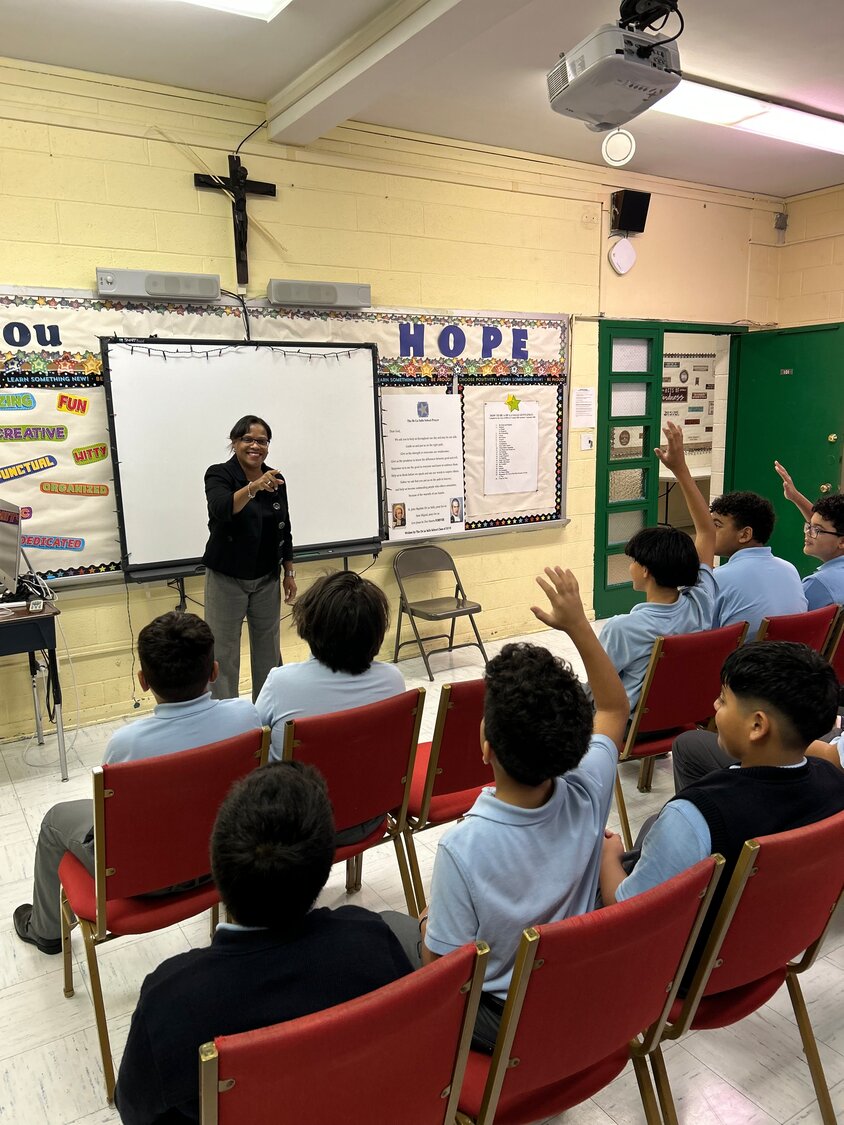De La Salle School welcomes new executive director
The new school year has begun, and Roxanna DePena-Elder has taken up the mantle of executive director of Freeport’s De La Salle School, succeeding William Gault. The transition marks a pivotal moment in the history of the school, with DePena-Elder poised to lead the institution into a new era.
“She’s a person with great experience, a very varied experience,” said Gault, who was the executive director for eight years. “She’s had 25 years of Catholic education as well, and I’m fully confident that she’s ready to fill the role. I’ve worked very closely over the last year. And I have every confidence that she’ll pick up the baton and carry it forward.”
DePena-Elder’s professional journey is a testament to her commitment to education. With over two decades of experience in the field, she brings a deep reservoir of knowledge and passion to her new role. Her career path has been a remarkable one, driven by a desire to make a meaningful impact on the lives of students and their families.
DePena-Elder’s educational journey began in earnest in the Diocese of Brooklyn and Queens. During these formative years, she served in various capacities, starting as a teacher before ascending the ranks to become an assistant principal. Her journey continued as she assumed the pivotal role of principal, where she honed her leadership skills and gained invaluable insights into the workings of a school community.
“I always loved education and loved helping children and recognized the role that educators play in forming and helping, working with parents in forming the god-fearing person that stands in front of me,” DePena-Elder said.
Her passion for education, however, goes beyond professional achievements. It is deeply rooted in her own experiences as a student. DePena-Elder fondly recalls the impact of her grammar school teacher, Susan Cappiello, who instilled in her a love for English and the power of the written word. This influence set the course for her future, leading her to earn degrees in English and education.
She eventually became an English teacher, inspired to make a difference in the lives of her students. Additionally, DePena-Elder’s mother, an educator herself, played a significant role in shaping her passion for teaching. The amalgamation of these influences, a dedicated teacher and a loving, education-oriented mother, solidified her commitment to the field.
Over time, DePena-Elder’s dedication and expertise became evident to those around her, leading to her appointment as a District Superintendent where she was responsible for thirty three schools located throughout Brooklyn. In this role, she oversaw multiple schools within the district, further expanding her understanding of educational administration and the challenges that educators face daily.
DePena-Elder’s ascension to the position of executive director at the De La Salle School is not just a culmination of her years of experience but also a testament to her dedication to the school’s mission. Before stepping into her current role, she served as associate executive director for a year, affording her the opportunity to immerse herself in the school’s ethos and operations.
“This is actually my second year, but the last year I was here as associate executive director, which gave me a great opportunity to work with the current Executive Director and learn the school and how things work,” DePena-Elder said. “Before that, it was my 25th year in education.”
The De La Salle School operates uniquely within the realm of Catholic education. Unlike typical diocesan schools that rely on tuition fees, this institution sustains itself primarily through the support of generous donors who believe fervently in its mission. DePena-Elder holds immense gratitude for these donors, recognizing the pivotal role they play in providing underprivileged students with access to quality education.
Nevertheless, the financial model that relies on donors presents its set of challenges. DePena-Elder acknowledges that securing funding to sustain the school’s operations and enhance its offerings is a perpetual concern.
“The biggest challenge is the donor and the donor base,” DePena-Elder said. “We are not a tuition-based school, so there is a constant need for finding new funding. Making sure that I am actively researching, identifying, and actually doing the work of the grants is crucial.”
As executive director, DePena-Elder’s leadership is centered on preserving and enhancing the Lasallian traditions that have been the bedrock of the De La Salle School’s success.
“I just want to make sure that the school is around 400 years. We are just getting started, we now have 250 to 270 graduates,” DePena-Elder said. “When we change a child’s life, we not only change that child, but we change his family and the success of the child’s family.”
Looking ahead, DePena-Elder envisions a future where the De La Salle School continues to stand as a beacon of hope and opportunity for generations of students. She is driven by a profound desire to break the cycle of poverty and provide the best possible education for those in need. Under her guidance, the school is poised to fulfill its mission of transforming the lives of its students and their families.
Her legacy, she hopes, will be one of lasting impact, ensuring that the De La Salle School remains a cornerstone of excellence in education for years to come.






